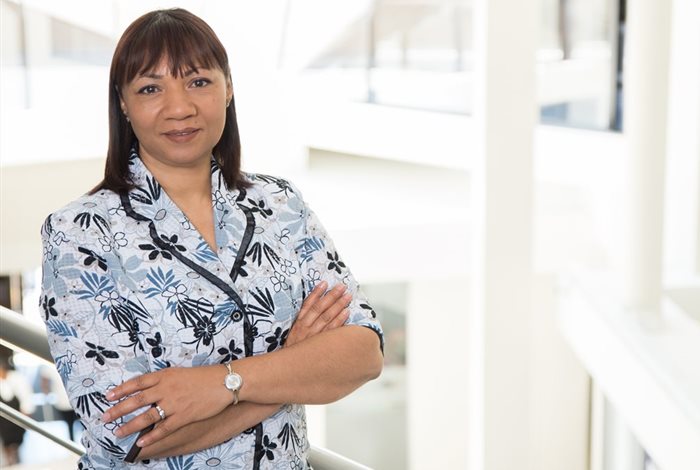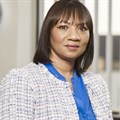When Bertina Engelbrecht took the helm as Clicks Group CEO in January this year, she became the first Black woman to lead a listed retail group in South Africa.

Bertina Engelbrecht, Clicks CEO. Source: Supplied
Engelbrecht's CEO appointment was significant for the country's retail and broader business community, and is particularly inspiring considering the humble background from which she hails.
Born in a rural Eastern Cape town and raised on the Cape Flats, Engelbrecht was encouraged by her family to pursue excellence in education, and she did, eventually obtaining her Masters in Commercial Law and beginning her career as an attorney. She later transitioned into HR leadership and steadily rose up the ranks to executive management level - a career progression she credits to hard work and a supportive community at home and at the office.
Engelbrecht has occupied roles including corporate manager of Transnet, director of organisational effectiveness at Sea Harvest, regional human resources manager for Shell Oil Products Africa and general manager for Shell SA Energy.
Her journey at Clicks began in 2006 when she joined the health and beauty retailer as group human resources director and was then appointed as an executive director in 2008. In December 2020, Engelbrecht's portfolio was expanded to include strategic stakeholder engagement. Prior to this year's appointment as Clicks Group CEO, she was the company's corporate affairs director.
While Engelbrecht stepping into the Clicks CEO position made headlines, as an advocate for gender equality her hope for the future is that female leadership appointments cease being newsworthy, and become a norm rather than the exception.
Here, Engelbrecht chats to us about workplace diversity, her path to leading one of SA's most prominent retailers, and how her HR experience groomed her for the top job.
Bertina, tell us a bit about yourself... your upbringing, educational background and early career?
I was born in Nieu-Bethesda, a small rural town in the Eastern Cape, but we relocated to the Western Cape when I was 5 years old. I lived in Elsies River, where I completed my primary school and then my secondary schooling in Bishop Lavis.
Tobie Titus (my Afrikaans teacher) was instrumental in securing the AFS (American Field Scholarship) for me which led to me completing my high school studies at the Acalanes High School in California. Upon my return to South Africa, I studied law and obtained a B.Proc from the University of Western Cape, paying for my studies with the proceeds from winning the prestigious Lions International Speech contest in 1981.
I hold a Masters in Commercial Law from UCT and completed various multi-disciplined courses throughout my career. I was admitted as an attorney of the Supreme Court of South Africa in 1989.
Although we were by no means well-off in any sense, my father was an educator and my mom a registered nursing sister, so I grew up in a household that placed a premium on education and one in which it was accepted that girls were just as capable as boys.
How do you feel the skills learned working in HR have equipped you for your role as Clicks Group CEO?
A study by Dave Ulrich et al. found that the executive profile of chief human resources officers (CHRO) to be the profile that most overlaps with that of the CEO's (other than the COO role where the roles and responsibilities overlap significantly). The Ulrich research study compared leadership assessments of leaders in high-performing organisations in six C-suite functions (CEO, CFC, COO, CIO, CHRO and CMO) and although the results surprised the researchers, this study has since been replicated with similar results.
Successful HR leaders need to be able to balance strategy with operational efficiency through a values-based approach that drives sustainable outcomes.
Within HR, you can get to know businesses extremely well and understand the dynamics throughout the organisation. You engage with internal leaders (current and future talent) and external stakeholders, and you learn how to manage relationships with diverse stakeholders (the board, regulators, customers, etc.).
Importantly, the CHRO understands how best to navigate organisational ambiguity, and understand the inter-relatedness of various disciplines – if they then also acquire sufficient technical and financial skills and career experience in their industry, they have a pathway to the CEO role.
The pandemic has also shaped the role of the CEO – employees desire a more transformational leader who inspires them and for more firms that embrace sustainable, ethical business practices.
How would you describe your climb up the career ladder?
Like most people, my career progression was not easy or linear. I had the privilege of parents and siblings who supported me in my career choice, I had a good quality education and I have had managers who were patient in mentoring and coaching me and who actively championed my progression. And I was blessed to have a husband who advocated strongly for gender empowerment.
I was prepared to put in the effort, to put up my hand to volunteer, to critically assess my development needs and to work on improving my competencies. And I have had fantastic teams who embraced the pursuit of excellence.
Do you think the South African retail industry could benefit from more female leadership?
An ever-increasing number of studies that have been examining diversity in executive teams have concluded that the likelihood of financial outperformance is strengthened when you have more diverse teams who operate within inclusive cultures.
Whilst we currently only have eight female CEOs on the JSE, I sense that the tide is turning and that this number will grow, and when you consider that the vast majority of retail customers are female, then more diverse retail leadership should benefit customer-centric innovations and market success.
What do you view as the key qualities needed to capably lead a company like Clicks Group?
• We are a high-performing company – so you cannot slack.
• You must know your market, customers, suppliers, partners and your regulator and you have to be a cheerleader for your teams.
• You must embrace the uniqueness of our role in South Africa – which is to deliver affordable, accessible healthcare to all.
• In retail, you need to be resilient because the market dynamics, the consumer preferences and the regulations (to name a few) are changing all the time.
• You must lead by example – you cannot expect the employees to strive for excellence if you don’t do so yourself.
• You mustn’t take yourself too seriously and you must genuinely like people!
What do you love most about your work?
I love the fact that I can make a difference and that my efforts are visible (at least to me). I work in an extremely stimulating environment that is influenced by events at the macro and micro environmental level which keeps me abreast of events so I can respond promptly and responsibly.
We are at the forefront of satisfying customers’ health, beauty and wellness needs, and we are constantly reviewing how best we can deliver a customer offering that is both affordable and accessible.
I am invigorated by the growth in young adults who enter the workplace and the role that our learning academies and HR practices play in supporting career growth and development.
I’ve just recently become an aunt, so I love shopping our Baby category and catching up on the stages of early childhood development.
In your opinion, where does the true value lie in ensuring a diverse, inclusive work environment?
I continue to believe in the innate goodness of my fellow human beings. When the other is not known, when we don’t engage with people who are different from us, then we become needlessly fearful.
Diverse, empowered and inclusive environments help us to get to know one another at a deeper level and to appreciate that our lived experiences shape our perspectives.
If we can harness the value of our diversity, we have the potential to achieve greatness.
How do you maintain a work-life balance?
I love reading, cooking, catching up with my girlfriends and travelling (preferably with my brother because he is the best travel companion).
What is your hope for future generations of women in your field?
• Gender disparities have been eradicated to the extent that is no longer newsworthy if a woman is appointed as the CEO of any listed entity.
• The gender bias reflected in a gender pay gap, the motherhood penalty, the broken career rung and micro-aggressions in the workplace have truly been broken.
• We have found ways to collaborate across sectors to support women and children who bear the brunt of gender-based violence. This requires supportive social workers, places of safety for victims, police officers, effective prosecutions and corrective programmes for perpetrators. And I would hope that the HeforShe programme is proudly endorsed by the men in our lives.

















































